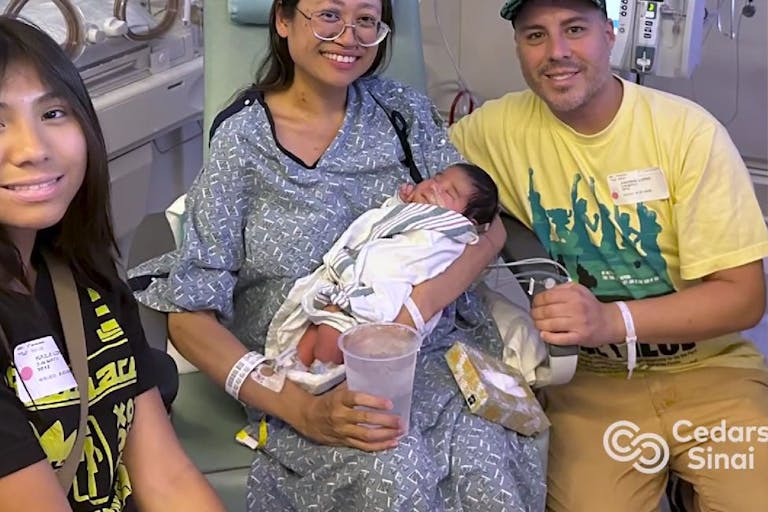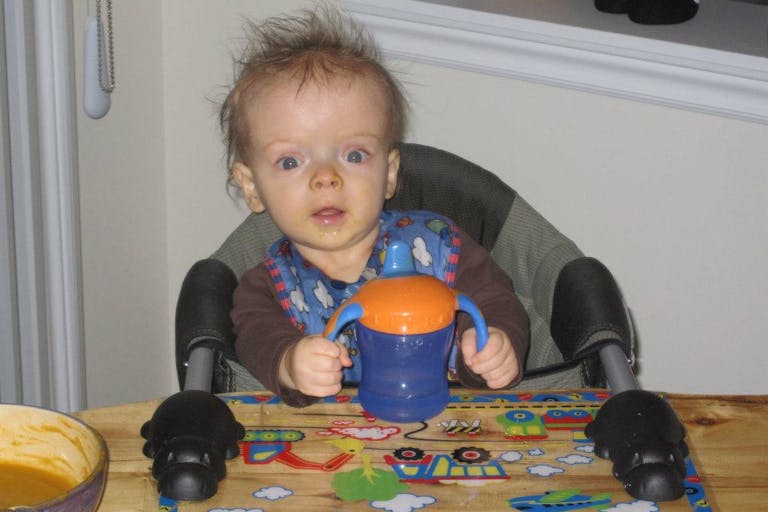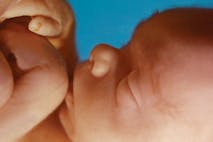
Full term 'miracle' baby born after 'unprecedented' ectopic pregnancy
Bridget Sielicki
·
At eight months, my doctor said he would “absolutely perform the abortion for me”
Smily Titus in his Rabbit
When you walk into Nicole and Steven’s house, you get the sense that they are parents who thoroughly enjoy their three kids. You’ll find Steven running down the narrow hallway while all the kids scream in delight, chasing each other and him. Nicole patiently fixes healthy meals for them while explaining to the youngest that she can’t climb up on the counter to help because the crockpot is just too hot for little hands. You’ll see Titus, their only son proudly popping wheelies in his special wheelchair while the family cheers. They are a family who seems to enjoy the little moments; the precious memories that the years have brought.
Entering their house, you’d never guess the ordeal they went through almost four years ago. Four years ago, Nicole was eight months pregnant with Titus, their second child. Since she was planning for a home birth, Nicole doesn’t remember exactly why she went in for an ultrasound that fateful—and miraculous—day.
As the routine ultrasound was being performed, Nicole could tell that something was definitely up. The doctor said nothing, but quickly called in another doctor. They consulted together while watching the screen and leaving Nicole clueless and helpless. For some reason, spina bifida popped into Nicole’s mind. “Is it spina bifida?” she asked. But the doctor couldn’t tell her anything; he just showed her what he saw on the screen. And it wasn’t good. Nicole and Steven were sent to a specialist, immediately.
The specialist had a huge ultrasound screen for Nicole and Steven to stare at. While they watched their eight-month-old son move his arms and head; while they saw his little heart beat quickly, the specialist diagnosed spina bifida and hydrocephalus, and put it all out there:
He said it was the biggest lesion he had ever seen; that our son would probably never go to the bathroom on his own. He’d never walk, never talk. He said this based on a 30 second ultrasound. He said, ‘I will absolutely perform the abortion for you.’ I could see Titus’ arms and head moving and his heart beating at the time the doctor said this. He was emphatic that Titus would be basically a vegetable and mentally retarded. And that it would be unfair to him for me to give birth.
At that moment, Nicole and Steven realized that their role in Titus’ life would be so much more than “parent.” Their role was now “advocate”, too. Without a word shared between them, both Nicole and Steven knew they would never accept abortion as an answer—no matter what the truth about Titus was.
Nicole explains: “From our faith, we believe that every life is precious—a gift from God—whether ‘normal’ or ‘perfect’ or not.” She also realized that it was divine intervention that the ultrasound had even taken place at all. A medical professional assured Nicole that, had she gone ahead with the planned home birth, either her or Titus would have certainly died from infection. “Nothing was left to chance,” Nicole says. “It was all orchestrated.”
When Titus was born by c-section, Nicole was only allowed to see his face. She couldn’t touch her son for at least two days, as he was recovering from immediate surgery for the softball-sized lesion on his back. Though she couldn’t touch him, Nicole refused to leave Titus’ side, even sleeping on the floor of the NICU to be beside him.
Titus as a Super Cute, Fuzzy-Haired Toddler
Article continues below
Dear Reader,
Have you ever wanted to share the miracle of human development with little ones? Live Action is proud to present the "Baby Olivia" board book, which presents the content of Live Action's "Baby Olivia" fetal development video in a fun, new format. It's perfect for helping little minds understand the complex and beautiful process of human development in the womb.
Receive our brand new Baby Olivia board book when you give a one-time gift of $30 or more (or begin a new monthly gift of $15 or more).
Nicole firmly believes that God has defied human knowledge and wisdom through Titus’s life. Her strong Christian faith leads her to believe that God is not controlled by the predictions of men. She will confidently tell you that the Lord has given their family everything they need to endure Titus’ difficulties. Is it hard? Yes. Is there pain? Yes. But, Titus’ courage and preciousness overwhelms everything else. He continues to prove the “specialist” wrong:
Every milestone, he has hit either before or right on. He is very intelligent and able. Titus doesn’t complain and fuss about why his legs don’t work or about anything else. He loves to do what little boys do. He knows his letters, numbers, and shapes—has known them since he was 2 ½. We wouldn’t have it any other way. Titus is definitely a huge addition to our family. This is how God made him—I fully believe this.
Nicole credits two things for helping her get through the shock of Titus’ diagnosis and giving her the strength to give him life: her strong faith in Christ and the year she spent working at a crisis pregnancy center in California. There, she grew in her confidence that each baby was indeed a precious individual, deserving of an equal chance at life. She believes parents often take the words of doctors too far and begin to question, “Can I really handle this? Is it really fair to my child?”
When I asked Nicole what she would say to other parents facing a similar diagnosis, she said:
I would say that for me, immediately, it was always either the Lord knows me or he doesn’t. And He either knows I need this or I don’t. Whatever happens in my life is His will for me at this time. This means I can move mountains. If this baby having issues or conditions is His will for me, it means I can get through it. If you think that someone tells you from a human perspective what you can or can’t handle, you don’t know God as the great Physician. We shouldn’t try to alter things in our own humanness or do something without knowing all the facts.
Even Nicole’s doctor didn’t have all the facts right. You can never know all the facts about your unborn child before they’re born. As Nicole believes, there’s no way you should make a decision to abort a child at all, but certainly not based off an ultrasound or a test.
Off an ultrasound, you cannot know a baby or everything about them or what they’re really like. There was no way the doctor knew all he said he knew about my son from that screen. Lots of times, the ultrasounds or tests are wrong anyway: when the mother says, ‘I don’t care,’ and the baby’s born, and nothing is wrong at all. How would you feel if someone could show you what your five year old would look like and you could see them face to face—would you be happy you ended their life?
About Titus, Nicole shares,
Right away, his life was a testimony. He’s so much fun—everyone that meets him loves him. He’s a really special kid. And almost everything the doctor said [besides the actual diagnosis of spina bifida and hydrocephalus] is completely wrong.
Nicole believes that more parents should educate themselves because knowledge is power. Doctors are important, she says, and they have a purpose, but you are the parent. The more you understand about anything you may have to go through, the more strength you’ll have for an arrow you’d otherwise not be prepared for. Things have changed so drastically over the years for babies born with spina bifida and other conditions, and they can truly lead almost normal lives.
Of course, normality (whatever that is!) is not the measure of a person’s worth, but it’s true that people have a very wrong perception of what individuals with Down Syndrome, spina bifida, and other “disabilities” can achieve in their lives.
In the end, Nicole says, “I wouldn’t have it any other way….It doesn’t matter what the child is or isn’t—they’re a gift!”
Live Action News is pro-life news and commentary from a pro-life perspective.
Contact editor@liveaction.org for questions, corrections, or if you are seeking permission to reprint any Live Action News content.
Guest Articles: To submit a guest article to Live Action News, email editor@liveaction.org with an attached Word document of 800-1000 words. Please also attach any photos relevant to your submission if applicable. If your submission is accepted for publication, you will be notified within three weeks. Guest articles are not compensated (see our Open License Agreement). Thank you for your interest in Live Action News!

Bridget Sielicki
·
Issues
Nancy Flanders
·
Politics
Bridget Sielicki
·
Issues
Sheena Rodriguez
·
Guest Column
Right to Life UK
·
Issues
Bridget Sielicki
·
Newsbreak
Kristi Burton Brown
·
Newsbreak
Kristi Burton Brown
·
Issues
Kristi Burton Brown
·
Newsbreak
Kristi Burton Brown
·
Newsbreak
Kristi Burton Brown
·